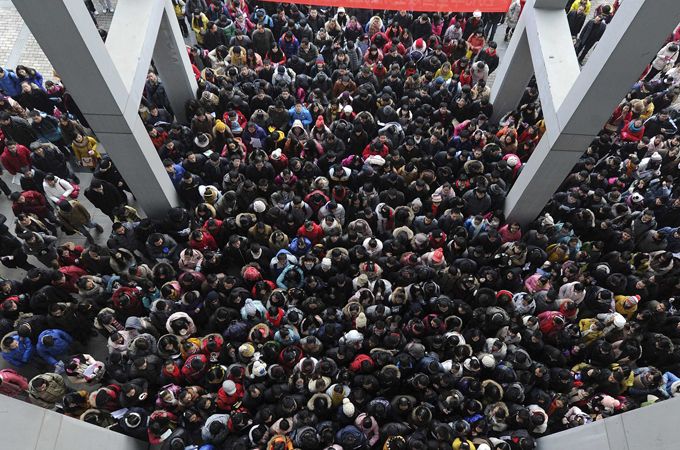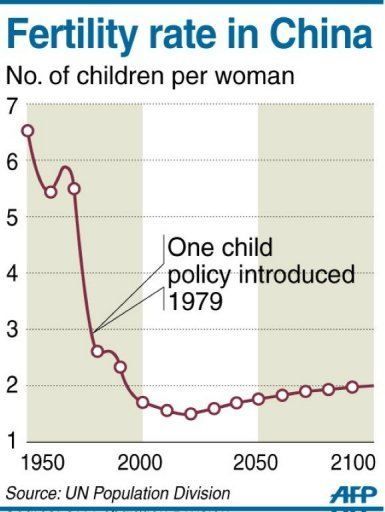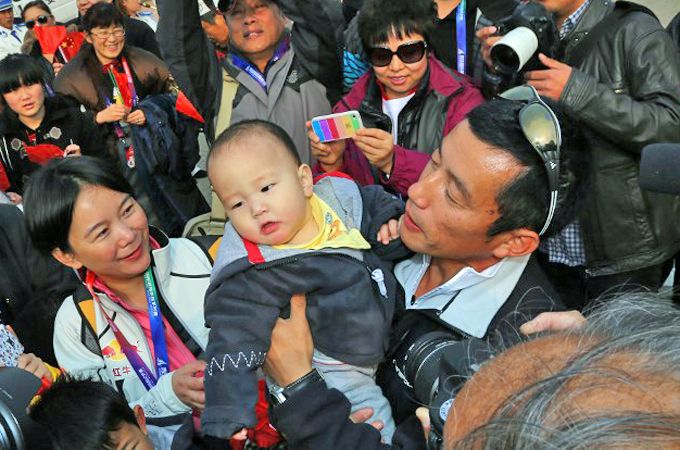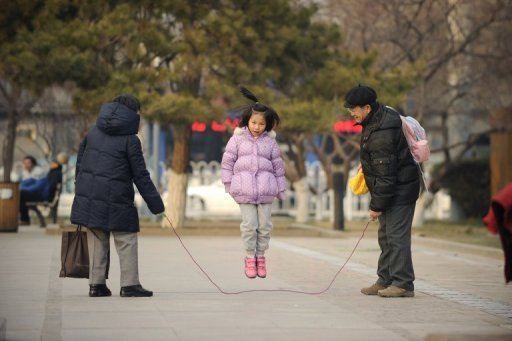華陀再世
一個中國醫學生(CMG)在美國的生活。。。
China's one-child policy has created a generation that is less trusting, more risk-averse and perhaps less likely to become entrepreneurs, according to new Australian research. Published in the journal Science on Friday, the study of more than 400 Beijing residents who were born around the time the controversial population policy was first introduced could have implications for China's economy, researchers said. "We found that individuals who grew up as single children as a result of China's one-child policy are significantly less trusting, less trustworthy, more risk-averse, less competitive, more pessimistic, and less conscientious," said University of Melbourne researcher Nisvan Erkal. China introduced the policy in 1979 to combat population growth and family planning officials in Beijing have defended it in the past, saying China's population, currently 1.3 billion, would have hit 1.7 billion without it. In an interview with Al Jazeera, Hong Kong professor Joseph Cheng said the study confirms what Chinese academics had warned as the "undesirable impact" of the rule. In recent years, there have been stories of parents and grandparents accompanying new university students "to wash for them and to cook for them", Cheng said. Additionally, the drop in the number of young workers entering the labor marker could contribute to an economic slowdown and decline in domestic consumption as early as 2015, Cheng said. Economic games During the study, scholars used a series of "economic games", in which the 421 subjects born between 1975 and 1983 exchanged or invested small amounts of money, or made other economic decisions, to measure their levels of trust, risk-taking and competitiveness. In one game, participants born under the one-child policy were on average found to be less trusting than those born before, sharing less of an endowment with another player. "We found that being born before or after the one-child policy best explains our observations," Erkal, an associate professor, said. Fellow researcher Lisa Cameron from Monash University said the effect could have economic implications. "Our data shows that people born under the one-child policy were less likely to be in more risky occupations like self-employment," she said. "Thus there may be implications for China in terms of a decline in entrepreneurial ability." The one-child policy in fact permits some families to have several children. Parents in the countryside can have two children if their firstborn is a girl, while ethnic minority families are often exempt from birth restrictions. Talk of phasing out the unpopular one-child policy has been mounting, with an influential think-tank with close links to the government recently proposing families be allowed to have two children by 2015. The China Development Research Foundation called for a relaxation of the policy in October, saying the country had paid "a huge political and social cost" for the measure, which has been blamed for creating a demographic time-bomb. 441 |
Source: Al Jazeera and agencies |

China's one-child policy has created a generation that is less trusting, more risk-averse and perhaps less likely to become entrepreneurs, according to new Australian research. Published in the journal Science on Friday, the study of more than 400 Beijing residents who were born around the time the controversial population policy was first introduced could have implications for China's economy, researchers said. "We found that individuals who grew up as single children as a result of China's one-child policy are significantly less trusting, less trustworthy, more risk-averse, less competitive, more pessimistic, and less conscientious," said University of Melbourne researcher Nisvan Erkal. China introduced the policy in 1979 to combat population growth and family planning officials in Beijing have defended it in the past, saying China's population, currently 1.3 billion, would have hit 1.7 billion without it. In an interview with Al Jazeera, Hong Kong professor Joseph Cheng said the study confirms what Chinese academics had warned as the "undesirable impact" of the rule. In recent years, there have been stories of parents and grandparents accompanying new university students "to wash for them and to cook for them", Cheng said. Additionally, the drop in the number of young workers entering the labor marker could contribute to an economic slowdown and decline in domestic consumption as early as 2015, Cheng said. Economic games During the study, scholars used a series of "economic games", in which the 421 subjects born between 1975 and 1983 exchanged or invested small amounts of money, or made other economic decisions, to measure their levels of trust, risk-taking and competitiveness. In one game, participants born under the one-child policy were on average found to be less trusting than those born before, sharing less of an endowment with another player. "We found that being born before or after the one-child policy best explains our observations," Erkal, an associate professor, said. Fellow researcher Lisa Cameron from Monash University said the effect could have economic implications. "Our data shows that people born under the one-child policy were less likely to be in more risky occupations like self-employment," she said. "Thus there may be implications for China in terms of a decline in entrepreneurial ability." The one-child policy in fact permits some families to have several children. Parents in the countryside can have two children if their firstborn is a girl, while ethnic minority families are often exempt from birth restrictions. Talk of phasing out the unpopular one-child policy has been mounting, with an influential think-tank with close links to the government recently proposing families be allowed to have two children by 2015. The China Development Research Foundation called for a relaxation of the policy in October, saying the country had paid "a huge political and social cost" for the measure, which has been blamed for creating a demographic time-bomb. 441 |
Source: Al Jazeera and agencies  |
China's one-child policy has created a generation that is less trusting, more risk-averse and perhaps less likely to become entrepreneurs, according to new Australian research. Published in the journal Science on Friday, the study of more than 400 Beijing residents who were born around the time the controversial population policy was first introduced could have implications for China's economy, researchers said. "We found that individuals who grew up as single children as a result of China's one-child policy are significantly less trusting, less trustworthy, more risk-averse, less competitive, more pessimistic, and less conscientious," said University of Melbourne researcher Nisvan Erkal. China introduced the policy in 1979 to combat population growth and family planning officials in Beijing have defended it in the past, saying China's population, currently 1.3 billion, would have hit 1.7 billion without it. In an interview with Al Jazeera, Hong Kong professor Joseph Cheng said the study confirms what Chinese academics had warned as the "undesirable impact" of the rule. In recent years, there have been stories of parents and grandparents accompanying new university students "to wash for them and to cook for them", Cheng said. Additionally, the drop in the number of young workers entering the labor marker could contribute to an economic slowdown and decline in domestic consumption as early as 2015, Cheng said. Economic games During the study, scholars used a series of "economic games", in which the 421 subjects born between 1975 and 1983 exchanged or invested small amounts of money, or made other economic decisions, to measure their levels of trust, risk-taking and competitiveness. In one game, participants born under the one-child policy were on average found to be less trusting than those born before, sharing less of an endowment with another player. "We found that being born before or after the one-child policy best explains our observations," Erkal, an associate professor, said. Fellow researcher Lisa Cameron from Monash University said the effect could have economic implications. "Our data shows that people born under the one-child policy were less likely to be in more risky occupations like self-employment," she said. "Thus there may be implications for China in terms of a decline in entrepreneurial ability." The one-child policy in fact permits some families to have several children. Parents in the countryside can have two children if their firstborn is a girl, while ethnic minority families are often exempt from birth restrictions. Talk of phasing out the unpopular one-child policy has been mounting, with an influential think-tank with close links to the government recently proposing families be allowed to have two children by 2015. The China Development Research Foundation called for a relaxation of the policy in October, saying the country had paid "a huge political and social cost" for the measure, which has been blamed for creating a demographic time-bomb. 441 |
Source: Al Jazeera and agencies  |
China's one-child policy has created a generation that is less trusting, more risk-averse and perhaps less likely to become entrepreneurs, according to new Australian research. Published in the journal Science on Friday, the study of more than 400 Beijing residents who were born around the time the controversial population policy was first introduced could have implications for China's economy, researchers said. "We found that individuals who grew up as single children as a result of China's one-child policy are significantly less trusting, less trustworthy, more risk-averse, less competitive, more pessimistic, and less conscientious," said University of Melbourne researcher Nisvan Erkal. China introduced the policy in 1979 to combat population growth and family planning officials in Beijing have defended it in the past, saying China's population, currently 1.3 billion, would have hit 1.7 billion without it. In an interview with Al Jazeera, Hong Kong professor Joseph Cheng said the study confirms what Chinese academics had warned as the "undesirable impact" of the rule. In recent years, there have been stories of parents and grandparents accompanying new university students "to wash for them and to cook for them", Cheng said. Additionally, the drop in the number of young workers entering the labor marker could contribute to an economic slowdown and decline in domestic consumption as early as 2015, Cheng said. Economic games During the study, scholars used a series of "economic games", in which the 421 subjects born between 1975 and 1983 exchanged or invested small amounts of money, or made other economic decisions, to measure their levels of trust, risk-taking and competitiveness. In one game, participants born under the one-child policy were on average found to be less trusting than those born before, sharing less of an endowment with another player. "We found that being born before or after the one-child policy best explains our observations," Erkal, an associate professor, said. Fellow researcher Lisa Cameron from Monash University said the effect could have economic implications. "Our data shows that people born under the one-child policy were less likely to be in more risky occupations like self-employment," she said. "Thus there may be implications for China in terms of a decline in entrepreneurial ability." The one-child policy in fact permits some families to have several children. Parents in the countryside can have two children if their firstborn is a girl, while ethnic minority families are often exempt from birth restrictions. Talk of phasing out the unpopular one-child policy has been mounting, with an influential think-tank with close links to the government recently proposing families be allowed to have two children by 2015. The China Development Research Foundation called for a relaxation of the policy in October, saying the country had paid "a huge political and social cost" for the measure, which has been blamed for creating a demographic time-bomb. 441 |
Source: Al Jazeera and agencies |




